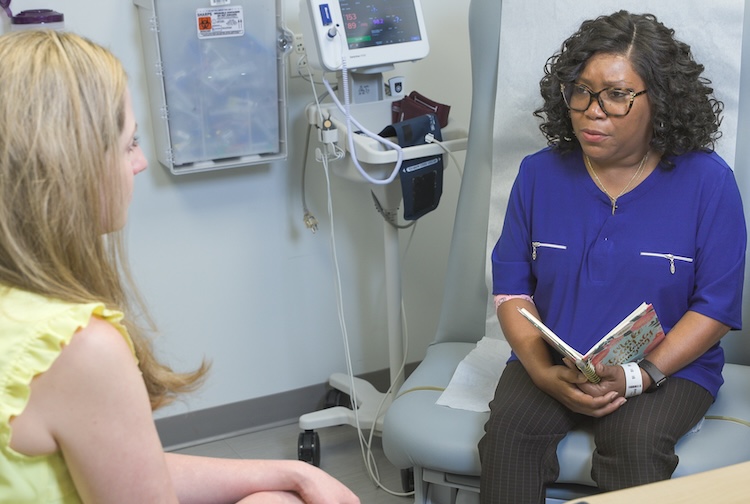VCU researchers use virtual reality games as exercise therapy for Parkinson's patients
James Thomas leads a team at VCU's Motor Control Lab who are developing immersive games to help those with trunk control impairments get moving.
September 09, 2021 Bill McDaniel helps a man with Parkinson's disease try out the new therapy. (Photo: Jeff Kelley)
Bill McDaniel helps a man with Parkinson's disease try out the new therapy. (Photo: Jeff Kelley)
By Jeff Kelley
You'd call them games. James S. Thomas, Ph.D., a professor in the Department of Physical Therapy at Virginia Commonwealth University, and his team call them interventions for patients with movement disorders.
What began as a clinical trial at VCU to learn whether virtual reality (VR) games could relieve lower back pain has evolved to include their use as therapy for those with Parkinson's disease.
Thomas leads a team of multidisciplinary researchers at VCU's Motor Control Lab in the College of Health Professions who are developing immersive VR games to help those with trunk control impairments caused by orthopedic or neurological conditions get moving.
“You feel like you're playing a game, but what's happening behind the scenes is that we've developed algorithms to tailor the game experience to the individual and encourage you to move with better trunk control,” Thomas recently told a small group of Parkinson's patients who gathered in a suburban park to see the lab's technology in action.
“We're trying to get you to move your body in a way that will help you maintain your quality of life, and hopefully get you moving better, so that you can enjoy more of life.”
Thomas and his team showcased two games with members of Power Over Parkinson's, a Richmond-area foundation whose mission is to reduce Parkinson's symptoms through the use of exercise. Individuals with Parkinson's come together for camaraderie and exercise in regularly scheduled events in the “Parkinson's Activity League.” At the event with VCU, participants were able to try the VR games developed by Thomas and give real-time feedback.
The first was a simple fishing game that lets users scoop fish that leap out of water and swat at an attacking shark every few seconds. The other, a dodgeball game, shoots red balls at an avatar of the user, who has to punch the balls from the air.
Participants wear a VR headset over their eyes and are immersed in a virtual world from the screen inside the device. They hold a small controller in each hand, which serves as a fishing net or dodgeball-swatting hands. “The games are all designed to progressively challenge not only how much they move, but how fast they move,” Thomas said.

Alexander Stamenkovic and Bill McDaniel try out a dodgeball game using a VR headset. (Photo: Jeff Kelley)
Such interventional therapy for Parkinson's disease patients began as part of a National Institutes of Health-funded clinical trial for lower back pain and fear of movement. The “Virtual Immersive Gaming to Optimize Recovery in Low Back Pain” trial, or “Project VIGOR,” had evolved from a single game to a suite of targeted gameplay options when the researchers realized the potential of training trunk control, an issue in Parkinson's patients.
“There is a lot of research to suggest that Parkinson's medication is not really as effective for symptoms that impact your core and back muscles as they are on muscles that control your arm and leg motion,” Thomas said.
Parkinson's is the most common movement disorder and the second most common neurodegenerative disorder, after Alzheimer's disease.
Whether due to back pain or Parkinson's disease, individuals can adopt similar movement strategies and often avoid movement of the trunk, which in both diagnoses makes the condition worse, said Alexander Stamenkovic, Ph.D., a postdoctoral fellow in the Motor Control Lab and the lead investigator on the Parkinson's project.
“In movement disorders such as Parkinson's disease and other neurological and neurodegenerative disorders that have a movement pathology, trunk control is a critical feature that is associated with large declines in people's loss of independence and function,” Stamenkovic said.
VCU Innovation Gateway has worked with Thomas since his arrival at VCU from Ohio University in late 2018. Innovation Gateway, which both protects and licenses university intellectual property and supports VCU-borne ventures, has provided guidance to the researcher on his protectable IP and possible pathways to bring the VR interventions to market.
“Virtual reality, or more broadly XR/extended reality, is a rapidly developing space that offers incredible opportunities for companies and investors,” said Brent Fagg, a licensing associate with Innovation Gateway. “Collaboration between VCU's health science, communication arts and computer science departments positions VCU to be a leader in VR/XR content with a focus on new health solutions. At Innovation Gateway, we are working to build our VR portfolio and commercialize the university's innovations in the field to benefit the public.”
The team plans to make future versions of the VR system more portable, with the software integrated directly into the headset and requiring no wired connection to a computer. Patients could use it at home, without help from a physical therapist.
“The idea is to have something where you're motivated and engaged, and you can put this headset on and work out and exercise anytime,” Thomas said.
In addition to a lower cost, the more compact future version would allow users to select their level of difficulty based on disease progression. Researchers even hope to use artificial intelligence to learn how the patient moves and automatically adapt the game to their capabilities. A virtual dodgeball being thrown at a person, for example, could speed up, slow down or change trajectories depending on how the user stands, sits or moves.
Bill McDaniel, 81, attended the event and tried the dodgeball game. In the real world, the Mechanicsville resident had to give up playing pickleball over a year ago after being diagnosed with symptoms of Parkinson's disease.
McDaniel told VCU research faculty and students that, in his first attempt, the balls were flying too fast and too hard. After a couple of button presses and adjusted settings, he was able to move at his own pace. “I can definitely see the value in these games,” he said.




